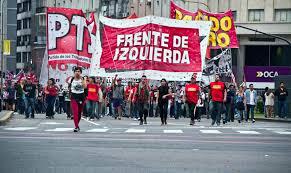
The Frente de Izquierda y los Trabajadores (the Left and Workers Front) or FIT went into last week's election with confidence. The new electoral alliance, comprised of the older and more doctrinaire trotskist formation Partido Obrero (Workers Party) or PO, the newer PTS (Socialist Workers Party), and the smaller IS (Socialist Left), hoped to build on recent electoral successes, including double digit tallies in a few provincial elections, and continue advancing along the ripples of youth and rank-and-file discontent against looming austerity and layoffs.
With a climate of polarization surrounding a contest that is to decide on the continuity of neo-populist Kirchnerism and the general rightward shift of the major electoral forces, peronist and non-peronist alike, this election was going to be challenging for the left. But the FIT nevertheless expected to increase its voter appeal and establish itself as a radical pole for left national politics. The Front's aim was to peel off sectors of the working class and progressives who are sympathetic to Kirchnerismo or straddle the fence, skeptical of its reform agenda yet unwilling to support the pro-business fractions of the mainstream opposition.
Many FIT sectors thought this was possible as Scioli, the candidate hand-picked by outgoing president Cristina Fernandez, was undeniable evidence that Kirchnerismso has exhausted any progressive potential and is inescapably moving to the right. In a race in which all leading candidates took positions that sought in some measure to win over business confidence, the FIT was optimistic that it could capitalize on a popular-left space it expected to open.
Surprisingly, the FIT was led by the PTS which edged out the PO-IS alliance in Argentina's bizarre compulsory primaries held in August (PASO). THe PTS claimed success both in terms of electoral performance and broader anti-capitalist political positioning celebrating that it's candidate, the youthful Nicolas del Cano, who surprised socialists and the entire country by being voted into congress in 2013 with 14% of votes, got 800,000 presidential votes and nearly 1,000,000 congressional votes cast for the FIT. While other FIT members have been relatively silent, the PTS is claiming that this election cemented the FIT's position as the 4th electoral force of the country, having displaced what remains of the 'progressive-liberal' opposition. It points to a vote total that compares favorably to the 500,000 votes the FIT received in the last 2011 presidential elections.
Unfortunately, a more pessimistic analysis of the FIT's electoral performance is more compelling. In terms of electoral results the inescapable fact is that the FIT failed to grow compared to its 2013 congressional vote total and the August primaries. This time around, the FIT got almost 500,000 fewer congressional votes than in 2013! And while it surpassed the half million presidential votes that it won in 2011, this increase should not be viewed as real growth. The FIT's low 2011 total came in the context of pro-Cristina euphoria which has since faded considerably.
Over the ensuing four years, things have turned south for Cristina and Kirchnerismo yet the FIT was unable to capitalize on growing popular discontent as it has been optimistically claiming it would do since the 2013 congressional elections. In this light, the extra 70,000 presidential votes it picked up since the PASO are discouraging. Considering that 300,000 voters went for other radical left candidates in the primaries, this marginal improvement indicates that the FIT was unable to turn out layers of the electorate that should be natural supporters. In other words, a chunk of Argentine radicals actively voted against the FIT. Viewed this way, the fourth place finish is not much of an accomplishment, reflecting instead anti-Kirchner mainstream realignment rather than actual consolidation of an anti-capitalist pole.
The PTS thought it could run a less orthodox campaign, targeting youth and women for instance, and thus win over the progressive wing of Kirchnerismo. It's fair to say this strategy failed for a number of reasons. But the defeat of the PO candidate (Altamira) in the primaries also shows that, though the alliance itself is a valuable step away from the characteristic sectarianism of Argentina's revolutionary socialists, it has not yet figured out how to run a non-dogmatic socialist campaign rooted in the working class and based primarily on anti-capitalist grievances. Nevertheless, even if the FIT failed to reach beyond its hard activist base of a small minority of worker activists and a majority of campus activists, the alliance deserves to be supported and inclusively transformed from within. If, however, the PTS continues to insist on combining programmatic purity with facile campaigning, prospects for the Argentine socialist left will remain weak.


Leave a Reply